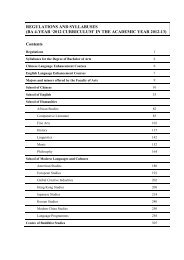Bachelor of Arts (BA) - The University of Hong Kong
Bachelor of Arts (BA) - The University of Hong Kong
Bachelor of Arts (BA) - The University of Hong Kong
You also want an ePaper? Increase the reach of your titles
YUMPU automatically turns print PDFs into web optimized ePapers that Google loves.
287PHIL2035.Philosophy <strong>of</strong> the Enlightenment (6 credits)(This course is also <strong>of</strong>fered to second and third year non-<strong>BA</strong> students for inter-Faculty broadeningpurposes.)<strong>The</strong> contents <strong>of</strong> this course will vary from year to year, but it is likely to cover several importanteighteenth-century thinkers including, but not limited to, Mandeville, Voltaire, Diderot, D'Alembert, LaMettrie, Rousseau and Kant. Details will be announced in good time in the departmental booklet'Choices in Philosophy'.Assessment: 100% coursework (may include in-class test).PHIL2040.Nietzsche (6 credits)(This course is also <strong>of</strong>fered to second and third year non-<strong>BA</strong> students for inter-Faculty broadeningpurposes.)Nietzsche occupies a special place in Western thought, both as a wholesale critic <strong>of</strong> the philosophicaltradition that went before him (e.g. Socrates, Kant), and as a precursor <strong>of</strong> certain philosophical trendsthat are important today (e.g. Foucault, Derrida). This course <strong>of</strong>fers an overview <strong>of</strong> Nietzsche'sphilosophy (including the will to power, perspectivism, nihilism, eternal return) and discussesNietzsche's influence on contemporary thought.Assessment: 100% coursework (may include in-class test).PHIL2060.Wittgenstein (6 credits)(This course is also <strong>of</strong>fered to second and third year non-<strong>BA</strong> students for inter-Faculty broadeningpurposes.)Wittgenstein said that his aim in philosophy was 'to show the fly the way out <strong>of</strong> the fly bottle'. By this hemeant that certain preconceptions, oversimplifications and poor analogies had led philosophers toconstruct misguided theories about such things as sensation, meaning, understanding and the nature <strong>of</strong>language, and that it was his task not to construct alternative theories but to point out the ways in whichthe theorists (including his earlier self) had become entrapped. This programme may appear modest,but Wittgenstein's approach has had far-reaching consequences and his work has received morediscussion than that <strong>of</strong> any other twentieth century philosopher and has influenced philosophy andmany other disciplines.Assessment: 100% coursework (may include in-class test).PHIL2077.Habermas (6 credits)(This course is also <strong>of</strong>fered to second and third year non-<strong>BA</strong> students for inter-Faculty broadeningpurposes.)<strong>The</strong> important German philosopher Habermas, combining strengths <strong>of</strong> the Continental andAnglo-American philosophical traditions, has developed a highly influential theory on a wide range <strong>of</strong>moral, political and historical issues. This course is designed to provide a general introduction toHabermas's interdisciplinary, comprehensive, and politically engaged way <strong>of</strong> doing philosophy. Topicscovered include discourse ethics, the public sphere, social action and rationality, technology and scienceas ideology, the nature <strong>of</strong> modernity, and legitimation problems in late capitalism.Assessment: 100% coursework (may include in-class test).
















